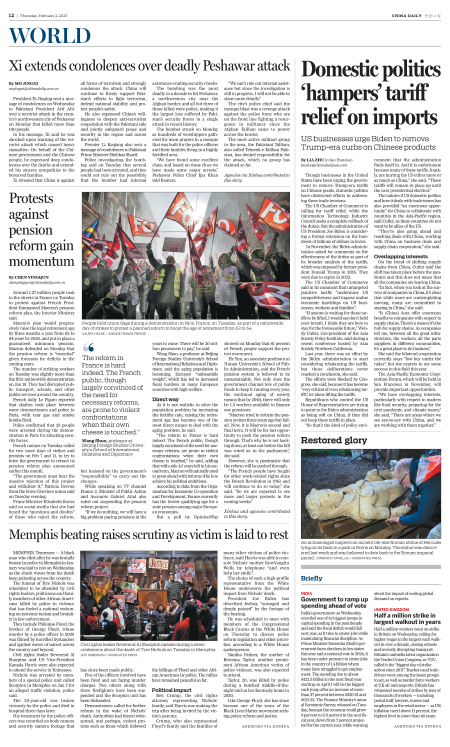Though businesses in the United States have been urging the government to remove Trump-era tariffs on Chinese goods, domestic politics have obstructed efforts in addressing these trade tensions.
The US Chamber of Commerce is calling for tariff relief, while the Information Technology Industry Council seeks a complete rollback of the duties. But the administration of US President Joe Biden is considering a formal extension on the hundreds of billions of dollars in levies.
In November, the Biden administration asked for comments on the effectiveness of the duties as part of its broader analysis of the tariffs, which was imposed by former president Donald Trump in 2018. They were due to expire in 2022.
The US Chamber of Commerce said in its comment that untargeted punitive tariffs "undermine US competitiveness and impose undue economic hardships on US businesses, workers and families".
"If anyone is waiting for those tariffs to be lifted, I would say don't hold your breath. I think they are here to stay for the foreseeable future," Wendy Cutler, vice-president of the Asia Society Policy Institute, said during a recent conference hosted by Asia Society Northern California.
Last year, there was an effort by the Biden administration to start considering rebalancing the tariffs, but those deliberations never reached a conclusion, she said.
The efforts were blocked by Congress, she said, because it has become "very critical of even rebalancing tariffs", let alone lifting the tariffs.
Republicans who control the US House of Representatives are trying to point to the Biden administration as being soft on China, if they did not keep these tariffs in place.
"So that's the kind of policy environment that the administration finds itself in. And it is unfortunate because many of these tariffs, frankly, are hurting the US either more or as much as China," she said. "These tariffs will remain in place up until the next presidential election."
The nature of US domestic politics and how it deals with trade issues has also provided "an enormous opportunity" for China to collaborate with countries in the Asia-Pacific region, said Cutler, as these countries do not want to be allies of the US.
"They're also going ahead and reaching deals with China, working with China on business deals and supply chain cooperation," she said.
Overlapping interests
On the trend of shifting supply chains from China, Cutler said the shift has taken place before the pandemic and this does not mean that all the companies are leaving China.
"In fact, when you look at the surveys of companies in China, it's clear that while more are contemplating moving, many are committed to staying in China," she said.
"It (China) does offer enormous benefits to companies with respect to supply chains. There's a reason it's the hub for supply chains. As companies tell me, between all the great infrastructure, the workers, all the parts suppliers in different communities, it's a great place to do business."
She said the bilateral cooperation currently stays "low key under the radar", but she expects to see some success in this field this year.
The Asia-Pacific Economic Cooperation Forum, which will be held in San Francisco in November, will provide important opportunities.
"We have overlapping interests, particularly with respect to matters like food security, preparing for the next pandemic, and climate issues," she said. "There are areas where we see eye-to-eye with China, and we are working with them together."
liazhu@chinadailyusa.com

